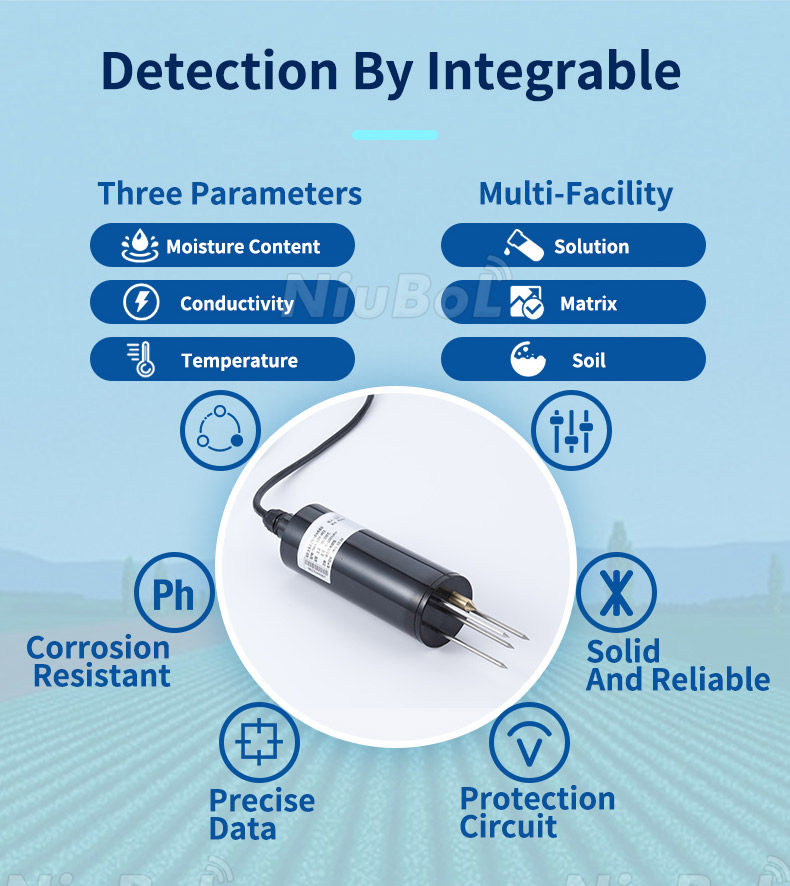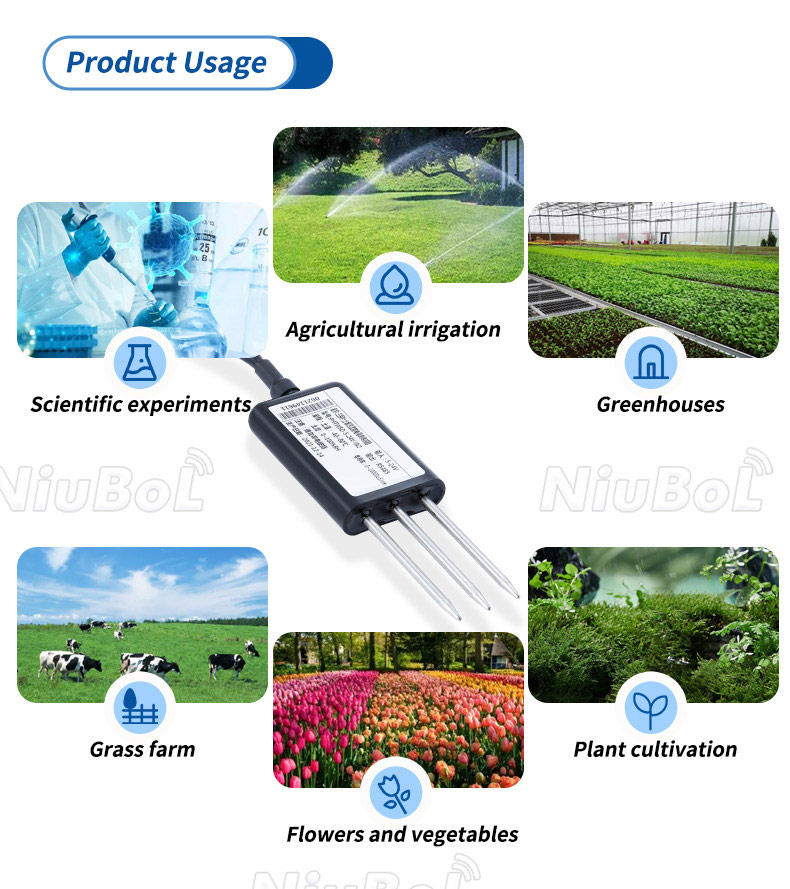

— Blogs —
—Products—
 Consumer hotline +8618073152920
Consumer hotline +8618073152920 WhatsApp:+8615367865107
Address:Room 102, District D, Houhu Industrial Park, Yuelu District, Changsha City, Hunan Province, China
Product knowledge
Time:2023-07-22 14:58:37 Popularity:637
A soil temperature and humidity sensor for irrigation is a device that measures soil temperature and humidity and is particularly suitable for irrigation management. It can provide important information about soil moisture and temperature conditions for efficient and accurate irrigation control.
These sensors usually include the following types:
Temperature sensor: this type of sensor is used to measure the temperature of the soil. It helps the farmer or horticulturist to know if the soil is too hot or too cold and take appropriate irrigation measures if necessary.
An irrigation soil moisture sensor is a device used to measure the moisture content in the soil, specifically designed for irrigation purposes. It provides essential information about the soil's water status, allowing for efficient and precise irrigation management.

Types of irrigation moisture sensors include capacitive sensors, resistive sensors,Tensiometers etc.
Tensiometers: These sensors measure soil moisture indirectly by measuring the soil's suction or tension. They consist of a tube filled with water and a porous ceramic tip that is inserted into the soil. As the soil dries out, water is drawn out of the tube, and the water level is measured to determine soil moisture.
Capacitance Sensors: Capacitance-based sensors measure soil moisture by analyzing the electrical capacitance between two electrodes inserted into the soil. The moisture content affects the dielectric constant of the soil, which is related to capacitance. These sensors provide a direct measurement of volumetric soil moisture.
Time-Domain Reflectometry (TDR) Sensors: TDR sensors measure soil moisture by sending an electromagnetic pulse along metal rods or waveguides inserted into the soil. The time it takes for the pulse to travel through the soil and reflect back indicates the soil's moisture content. This method provides a direct measurement of volumetric soil moisture.

Frequency-Domain Reflectometry (FDR) Sensors: Similar to TDR, FDR sensors measure soil moisture by analyzing the electrical impedance of the soil. They use low-frequency electromagnetic waves to determine the soil's moisture content. These sensors also provide a direct measurement of volumetric soil moisture.
Irrigation soil moisture sensors help in optimizing irrigation schedules, These sensors perform the function of monitoring and recording soil temperature and humidity by connecting to an irrigation control system or data acquisition device. Using this real-time data, farmers and horticulturists can guide irrigation decisions and customise appropriate irrigation schedules based on soil temperature and humidity conditions. This avoids overwatering or water shortages, improves irrigation efficiency, reduces water waste, and promotes healthy crop growth and yields.
Agriculture-Sensors-Catalog-NiuBoL-2024.pdf
Related recommendations
Sensors & Weather Stations Catalog
Agriculture Sensors and Weather Stations Catalog-NiuBoL.pdf
Weather Stations Catalog-NiuBoL.pdf
Related products
 Combined air temperature and relative humidity sensor
Combined air temperature and relative humidity sensor Soil Moisture Temperature sensor for irrigation
Soil Moisture Temperature sensor for irrigation Soil pH sensor RS485 soil Testing instrument soil ph meter for agriculture
Soil pH sensor RS485 soil Testing instrument soil ph meter for agriculture Wind Speed sensor Output Modbus/RS485/Analog/0-5V/4-20mA
Wind Speed sensor Output Modbus/RS485/Analog/0-5V/4-20mA Tipping bucket rain gauge for weather monitoring auto rainfall sensor RS485/Outdoor/stainless steel
Tipping bucket rain gauge for weather monitoring auto rainfall sensor RS485/Outdoor/stainless steel Pyranometer Solar Radiation Sensor 4-20mA/RS485
Pyranometer Solar Radiation Sensor 4-20mA/RS485
Screenshot, WhatsApp to identify the QR code
WhatsApp number:+8615367865107
(Click on WhatsApp to copy and add friends)